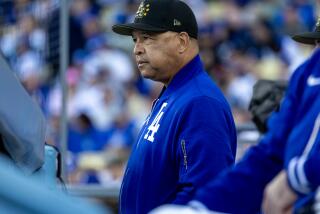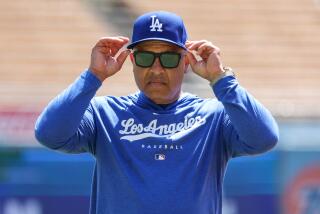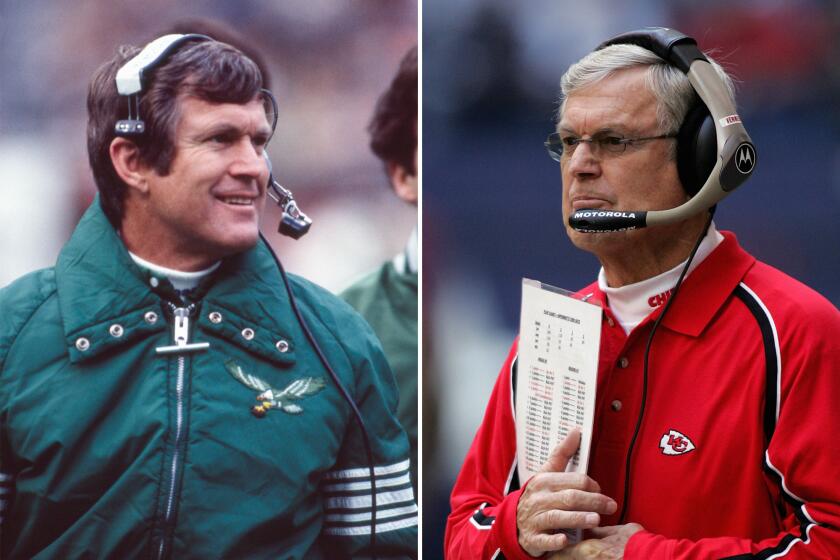Commentary : Perhaps Time Was Right for Peters to Leave Orioles, Walk Into Sunset
- Share via
In a dozen years as general manager of the Baltimore Orioles, Hank Peters never had a wrinkle in his pants, a hair out of place or a lie on his lips. Tip to toe, he was clean as a hound’s tooth, honest as the day is long and punctual as a clock. The occasional cliche (like those) crept into his speech because poetry is seldom compatible with such hard direct competence. He was not a brilliant trend spotter or spellbinding talker. Nor was he the best at reading people, being something of a dry martini in a beer-chugging world. But he was tops at just about everything else.
When baseball folk called the Orioles “a class organization,” they meant Peters first of all. He symbolized stiff yet pleasant, conservative yet flexible rectitude. His strength was conceptualization, not imagination; he had a systematic sense of how to build an interlocking team.
After 40 years, Peters knew the front office wars inside out. In 1984, when the sport needed a commissioner to replace Bowie Kuhn, Peters was asked, informally, if he was available long before Peter Ueberroth ever got a call. In those days, so recent yet so distant, Peters was the reigning “Executive of the Year” in baseball and the Orioles were still world champions--his mark on them everyplace. Then 60, Peters was far too happy to leave the Orioles. “I had a lot of friends and supporters,” he said. “Who knows what might have happened.”
What did happen is that he stayed in Baltimore and last Monday was fired by owner Edward Bennett Williams.
In the last four years, Peters might easily have become grouchy or defensive. He might have fired this farm director or denounced that malingering star. He might have arched his back and told Williams to stop hounding him with nagging phone calls, second-guesses and endless anxieties.
Instead, Peters’ code wouldn’t let him rebel, so he and Williams maintained an uneasy truce which did justice to neither and hurt the club at every decision-making turn. At twilight, Peters would say, “Day” and Williams would say, “Night.” Neither was right or wrong, but the friction was constant.
“That’s exactly right,” Peters said of the twilight joke. “There were differences of opinion in lots of areas that built up. If you lose confidence in a general manager, then it’s time for a change . . .
“I’m a baseball man. I think I know it and I think I understand it a lot more than those who even might own it. I recognize that owners have proprietary rights and we have seen those exercised today. But I also think that if you’re going to be asked to do something, you have to have the freedom to do the job.”
Watching the two men was painful. Each knew the other’s accomplishments were worthy of obvious respect. Yet they drove each other nuts. Any delay or excess of caution was, to Williams, “Hanking around.” To Peters, Williams was an arrogant bull in a china closet that he only half understood.
“Maybe I’m not emotionally suited to this game,” Williams said. “I have a hard time losing 62 times and saying I had a great year.”
Williams said as much Monday at a press conference: “I kind of have the Harry Truman theory. The buck stops here. I take all the blame. I don’t try to parcel it out . . . (but) I’m here (as owner). I can’t replace myself.”
So, Williams reached a point where he had to fire Peters. Ultimately, Williams knew he’d get the heat for Orioles’ failures--even in his own eyes. “Ninety-six loses, that’s something wrong,” he said. “That’s something terrible. I think that’s something impossible to accept.”
Who will be the Orioles’ next GM? Peters thinks he knows: Williams. “He wants to be much more active, he told me,” said Peters, who goes to great syntactical lengths to avoid using Williams name. “That means the person who fills my chair will not be in a decision-making position.”
If Williams does hire a can-do, hell-bent type like Jack McKeon, the new man better agree with Williams’ basic directions. The Peters Way way rarely got a fair test because Williams usually crossed the wires. You can’t build from the bottom and nurture kids when so much money gets spent (and playing time gets commited) for free agents. This time, the Williams Way is going to stand or fall on merit, not die of indecision.
Williams thought Peters could not “pull the trigger” on trades. Peters thought Williams was trigger happy. “We worked hard as hell to try to make deals,” Peters said Monday. “As he will find out, it’s not easy to do.”
Peters believed in team chemistry and low-profile role players; Williams thought that sounded like bunk and wanted some 90 mile-an-hour fastballs. “The chemistry on this club has diminished and needs to be rekindled. That will take time,” Peters said. “But the attitude was better this year.”
Most of all, Williams wondered if Peters, at 63 and two years from retirement, could undertake the massive rebuilding of the Oriole infrastructure that is obviously needed. For instance, when Peters arrived, the Orioles’ scouts, such as Clyde Klutz, Ray Poitevint and Jim Russo, were the envy of baseball-obscure legends. But they got old and Peters never discovered their equals.
Right to the end--a 1-17 streak in September--Williams and Peters looked at the same sunset and saw night and day. “I don’t think there’s a total disaster on your hands here,” Peters said. “Not all these players can come back and have such terrible years. . . . We had an ungodly years for injuries--17 disablements. If we had been healthy could we have contended? Who knows.”
So, Peters joins many of the other Orioles of the ‘80’s who have left with touching sadness, not knowing how they could have acted differently or better. When it was mentioned to Peters Monday that it didn’t seem any of the old Orioles were going to get out of this period with their dignity intact, he responded, “It doesn’t look like it, does it,” an old acquaintance of Peters said Monday. “Yet we all contributed to what was really a Golden Era for the Orioles. From 1979 through 1983, for five years, we were the dominant team in baseball.”
Maybe Peters just needs a trade, like Mike Flanagan, John Shelby and Dennis Martinez. Or Storm Davis who’s rebounding in Oakland. Maybe even Earl Weaver hasn’t disappeared for good.
“That’s right,” said Peters, who’ll probably be Cleveland’s general manager by Thanksgiving. “I just needed a trade. I think when my rotator cuff and my quadriceps heals, I’ll be as good as new in the spring.”
More to Read
Go beyond the scoreboard
Get the latest on L.A.'s teams in the daily Sports Report newsletter.
You may occasionally receive promotional content from the Los Angeles Times.










